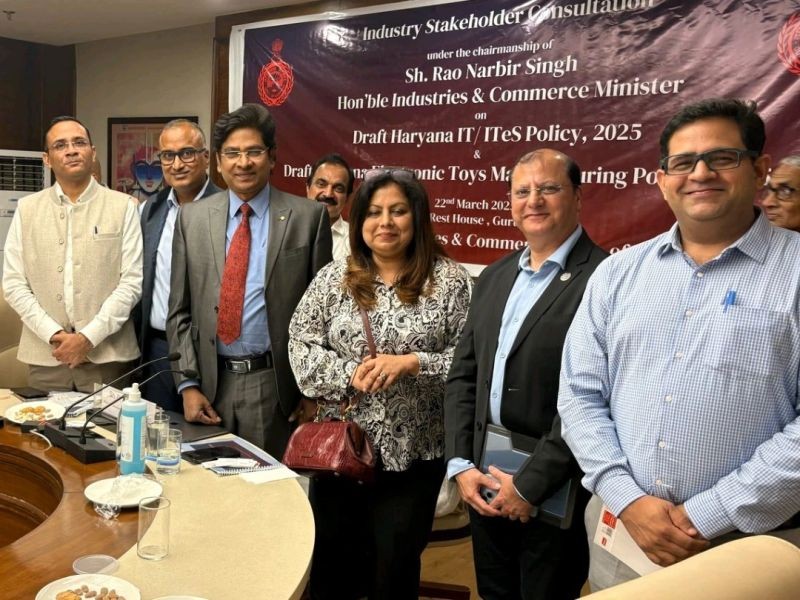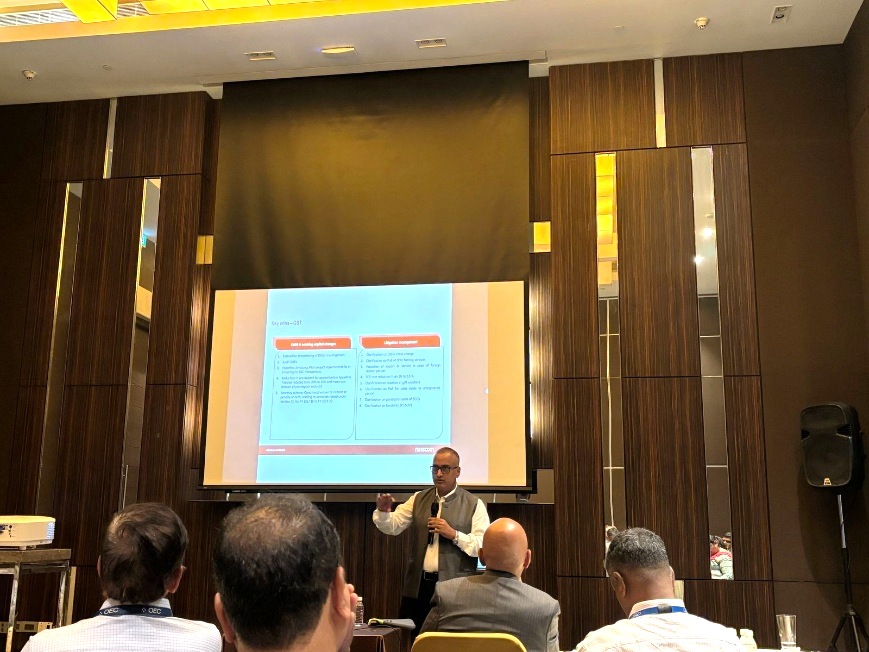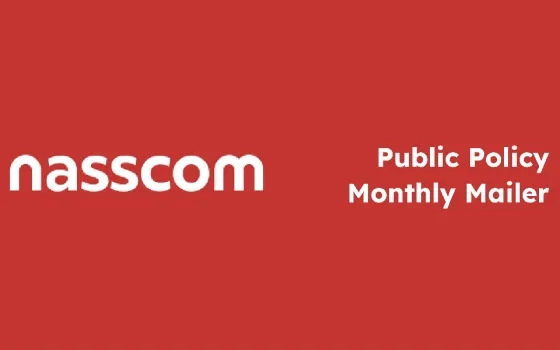|
Click here to view full email
|

|
Public Policy
Monthly Mailer
|
|
| April 2025 |
Vol 7, Issue 4 |
|

|
|
MEITY | Feedback on DPDP Rules, 2025
|
|
Nasscom engaged extensively with the technology industry to identify measures to strengthen the Draft Rules and submitted detailed feedback to MEITY on March 05, 2025.
|
|
We appreciated the approach undertaken by MEITY to proactively engage with the industry and other stakeholders on the draft Rules in a meaningful manner. We have highlighted the scope for providing further clarity on some of the draft Rules by using explanations, alternate text and/ or illustrations and provided specific instances for the same.
|
|
We have noted that the proposed Rule 12(4) creates a mechanism for imposing data localisation for significant data fiduciaries, over and above the restrictions provided under Section 16 of the Act and the proposed Rule 14 read with Section 16(1). We have submitted an alternate formulation that we believe should help strengthen the data protection safeguards without being disproportionate.
|
Going forward, based on our interactions with industry, the need for authoritative guidance on operationalising the Act will continue, and the Rules should provide an enabling mechanism to provide such guidance.
(Read more)
|
|
MoF | Expansion in scope of Safe Harbour Rules under Transfer Pricing
|
|
CBDT vide its notification dated March 25, 2025 increased the safe harbour eligibility threshold from INR 200 crore to INR 300 crore. Given that the government had announced the intent to expand the scope of safe harbour and streamline transfer pricing assessment procedure, in the last two Union Budgets, the industry was expecting a holistic review and a meaningful increase in the threshold.
|
|
The new threshold of Rs 300 crore i.e. about USD 35 mn is likely to continue to exclude about half of the GCCs. The new threshold is not an increase in real terms if we account for an annual inflation of 5.3%, since 2017 when the level was set at Rs 200 crore. In fact, in 2013 the threshold was Rs 500 crore before it was inexplicably reduced to Rs 200 crores in 2017. Nasscom had recommended a threshold of Rs 2000 crore i.e., close to USD 250 mn. Given this development, industry will continue to be required to rely on the expensive and time-consuming exercise of entering into the Advance Pricing Agreements.
|
|
In addition to the threshold, Nasscom had recommended for rationalisation of profit margin rates under the safe harbour – which continue to be too many and excessive, one the reason even most of the eligible entities do not opt for the safe harbour. We have also made a case for relaxation of the criteria of “insignificant risk” to be eligible for safe harbour and recommended that this be removed or changed to ‘limited risk” with a clear explanation else this creates avoidable subjectivity.
|
|
We will be discussing the developments with the industry and the government as we plan our next steps. In case you have any feedback on this, kindly contact tejasvi@nasscom.in.
|
|

|
|
GST | Memorandum highlighting scope for significant ease of doing business
|
Based on feedback from industry, we have submitted a memorandum of suggestions to officials of the Department of Revenue and GST Council highlighting issues being faced by the technology and ecommerce industry under GST. The suggestions are divided into the following categories namely:
- Issues impacting technology Industry – Need for removal of intermediary concept under GST, Challenges faced by IT/ ITeS companies operating through overseas branch offices, challenges in implementation of invoice management system and input service distribution mechanism, need for easing SEZ endorsement process.
- Ecommerce sector issues - Redressal of issues for services covered under S. 9(5) of CGST Act/ 5(5) of IGST Act w.r.t to delivery services, issues faced due to the requirement of having physical principal place of business in each state, measures for simplification of GST registration.
- Forward thinking ideas that are revenue neutral – Issues arising due to restriction on cross utilisation of CGST credit between distinct persons, payment of GST liability under reverse charge through cash payment, need for conversion of accumulated credit into tradeable scrips.
We believe implementing these measures will significantly improve the ease of doing business and provide certainty to the industry with respect to the treatment under GST.
(Read more)
|
|

|
|
GST | Meeting to discuss business models being followed by e-commerce operators
|
We participated in a meeting organised by MoF along with ecommerce operators to discuss the business models being followed by them and the treatment of delivery charges under GST. The comprehensive discussion was structured into three distinct segments, each focusing on a different category of e-commerce operators (ECOs):
- Goods transportation service providers and aggregators
- Traditional marketplace platforms
- Quick commerce platforms
During the meeting, industry representatives provided detailed insights into their operational and business models, with a specific focus on the GST landscape. Participants elaborately explained the intricate processes of order fulfillment, including the delivery of goods and provision of services, highlighting the complexity of modern digital commerce ecosystems. The dialogue aims at a proactive approach to understanding and streamlining the evolving e-commerce landscape within the broader taxation framework.
We will be following up with the Government for suitable next steps. For more details, kindly contact tejasvi@nasscom.in.
|
|
GST | Meeting to discuss challenges being faced by industry due to implementation of Input Service Distribution mechanism and invoice management system
|
|
We organised a meeting with the officials of GST Policy Wing along with industry to discuss the challenges being faced by industry due to the implementation of the Input Service Distribution (ISD) mechanism and invoice management system. On ISD, we highlighted the issue of having multiple ISD registrations, credit transfer mechanism within the same PAN and disputes regarding interpretation of “common credit”. On the invoice management system, we highlighted the need for Edit’ option for actions taken by recipient post filing of Form GSTR-3B and ‘pending’ option for Credit Notes, lack of clarity on interest exposure in the hands of the supplier and the need for government outreach/ workshops for MSME sector. For more information, kindly contact tejasvi@nasscom.in.
|
|
Haryana Govt | Interaction with Government on IT Policy
|

|
|
The Secretary, Department of Industries and Commerce, Haryana chaired an industry meeting on March 22, 2025 to discuss the draft IT policy for the state. Nasscom highlighted the need for a focus on skilling, EODB including self-certification, online mechanisms for approvals, ease of compliance, especially on labour related matters. We welcomed the government’s proposal to promote integrated development through mixed land use, dedicated focus on DCs and GCCs. Detailed inputs have been submitted to the government. For more information, kindly contact vertika@nasscom.in.
|
|
Haryana Govt | Meeting with Labour Commissioner on issue concerning EoDB in Haryana
|
|
Nasscom along with the industry representatives met the State Labour Commissioner on March 25, 2025, in Chandigarh to discuss certain EoDB concerns the IT/ITeS sector is facing in the state of Haryana. The Labour Commissioner duly acknowledged the challenges industry is facing and assured that constructive steps would emerge from the dialogue. We would continue to work closely with the state government of Haryana towards strengthening EoDB in the state.
|
|
Andhra Pradesh Govt | Interaction with Government on IT & GCC Policy
|

|
|
The ITE&C department of AP government organised an industry meeting on March 21, 2025 to discuss the operating guidelines of the IT & GCC Policy for the state. The meeting was chaired by Secretary, ITE&C. Nasscom presented its viewpoint on issues of talent, infrastructure, EODB and creating business environment. We also raised two important issues related to clearance of pending applications based on the previous policy and inclusion of nasscom/ industry representation in the consultative and State committees. The government provided assurance that these two issues will be resolved soon. We have submitted our detailed input. For more information, kindly contact vertika@nasscom.in.
|
|
MoF | Meeting to discuss tax issues related to Data Centers
|
|
We organised a meeting on March 11, 2025, with Tax Policy Research Unit in MoF along with industry to discuss the challenges being faced by industry regarding the tax treatment of foreign CSPs operating in India. Tax authorities are currently asserting that CSPs have established a fixed place PE in India, based on their interpretation that CSPs exercise control over data centers through deployed technology and software. We have requested the government to examine this issue as it is impacting data centre operations and digital infrastructure development in India. For more information, kindly contact tejasvi@nasscom.in.
|
|
Industry | CFO Meeting at Chennai
|

|
|
On March 13, 2025, we organised a roundtable discussion in Chennai along with CFOs from the industry to discuss various tax issues impacting the industry. During the meeting, industry leaders engaged in meaningful dialogue about regulatory challenges and shared valuable insights on navigating the complex tax landscape. During the session, we also presented and analysed the significant budget announcements relevant to industry stakeholders, examining how these new fiscal policies might influence business strategies and financial planning in the coming year. For more information, kindly contact tejasvi@nasscom.in.
|
|
AI Economics hosted by OpenAI & ICRIER
|
|
Nasscom participated in an interactive discussion on accelerating AI-driven economic growth in India, hosted by OpenAI’s Chief Economist in Delhi. The meeting, on March 18, 2025, was attended by senior policymakers, economists, and academics. The discussion highlighted that given the evolving nature of the technology, it is only expected that economists have varying estimates on the significance of AI’s contribution to economic growth, ranging from almost negligible to modest to very dramatic.
|
|
At Nasscom, we continue to work with the industry and the government to apply technology, including AI, to important challenges to drive gains, importantly inclusive growth, while minimising the negative effect of any disruption
|
|

|
|
SIG | First meeting of the Nasscom’s Special Interest Group on the Data Centre Ecosystem
|
|
We are organising a roundtable discussion in New Delhi on April 4, 2025, to formally announce the constitution of SIG on Data Centres and discuss the essential considerations for the ecosystem. The SIG is a nasscom-led initiative that, among other objectives, intends to collectively represent the common asks of the data centre industry. We are inviting a diverse set of stakeholders, including nominated members of SIG and senior officials from various government authorities to foster industry-government dialogue on various themes, such as availability of power, telecom connectivity, and taxation related issues.
|
|
BIS | Draft National Building Code of India Part 8 Building Services Section 6 Information and Communication Enabled Installations
|
BIS has initiated comments on the fourth revision of the NBC of India, specifically focusing on Part 8: Building Services, Section 6: Information and Communication Enabled Installations. The draft provides updated standards for high-speed data and wireless connectivity, introduces meshed bonded networks to reduce electromagnetic interference in high-density areas, and outlines solutions for strong indoor network coverage. It also promotes integrating small cells into street furniture for efficient connectivity and sets detailed guidelines for telecom cabling and infrastructure. Overall, it emphasizes designing flexible ICT infrastructure capable of accommodating technological advancements without major retrofitting over the coming decade. The last date for submission of comments is April 11, 2025.
(Read more)
|
|

|
|
DGFT | Amendment to Para 10.12(D) of the Handbook of Procedures 2023 - Revised Procedure for General Authorisation for Export after Repair (GAER)
|
DGFT has introduced amendments to streamline the export process for repaired SCOMET items under the GAER. Exporters can now secure a one-time general authorisation, valid for one year (unlike previous procedure), allowing multiple re-exports of imported SCOMET items to related entities or authorised vendors/OEMs abroad after repairs conducted in India. Key conditions include mandatory quarterly reporting to DGFT, no change or value addition during repairs, and re-exports limited strictly to original entities or authorised repair chains. Additionally, obtaining an ICP and AEO certification is mandatory to ensure compliance. Restrictions remain on exports destined for sanctioned countries or entities, or for items potentially applicable to military or weapons-related uses. In case you have any feedback, kindly contact swapnil@nasscom.in.
(Read more)
|
|
|
AEO
|
Authorised Economic Operator
|
|
AI
|
Artificial Intelligence
|
|
BIS
|
Bureau of Indian Standards
|
|
CBDT
|
Central Board of Direct Taxes
|
|
CSPs
|
Cloud Service Providers
|
|
DC
|
Data Centre
|
|
DPDP
|
Digital Personal Data Protection
|
|
DGFT
|
Directorate General of Foreign Trade
|
|
EODB
|
Ease of Doing Business
|
|
GCC
|
Global Capability Centre
|
|
GST
|
Goods and Services Tax
|
|
ICP
|
Internal Compliance Program
|
|
ICT
|
Information and Communication Technology
|
|
IP
|
Intellectual Property
|
|
IT
|
Information Technology
|
|
ITE&C
|
Information Technology, Electronics & Communications
|
|
MEITY
|
Ministry of Electronics and Information Technology
|
|
NBC
|
Insurance Regulatory and Development Authority of India
|
|
OEM
|
Original Equipment Manufacturer
|
|
PE
|
Permanent Establishment
|
|
SCOMET
|
Special Chemicals, Organisms, Materials, Equipment, and Technologies
|
|
SIG
|
Special Interest Group
|
|
|
|
|
www.nasscom.in
|




|




















![[UPDATE] Release of Guidelines for Examination of Computer-related Inventions (CRIs), 2025](https://community.nasscom.in/sites/default/files/styles/560_x_350/public/media/images/For%20Blog%20-nasscom%20public%20policy%20960%20x%20600%20png_14.png.webp?itok=TVoaAkX5)
